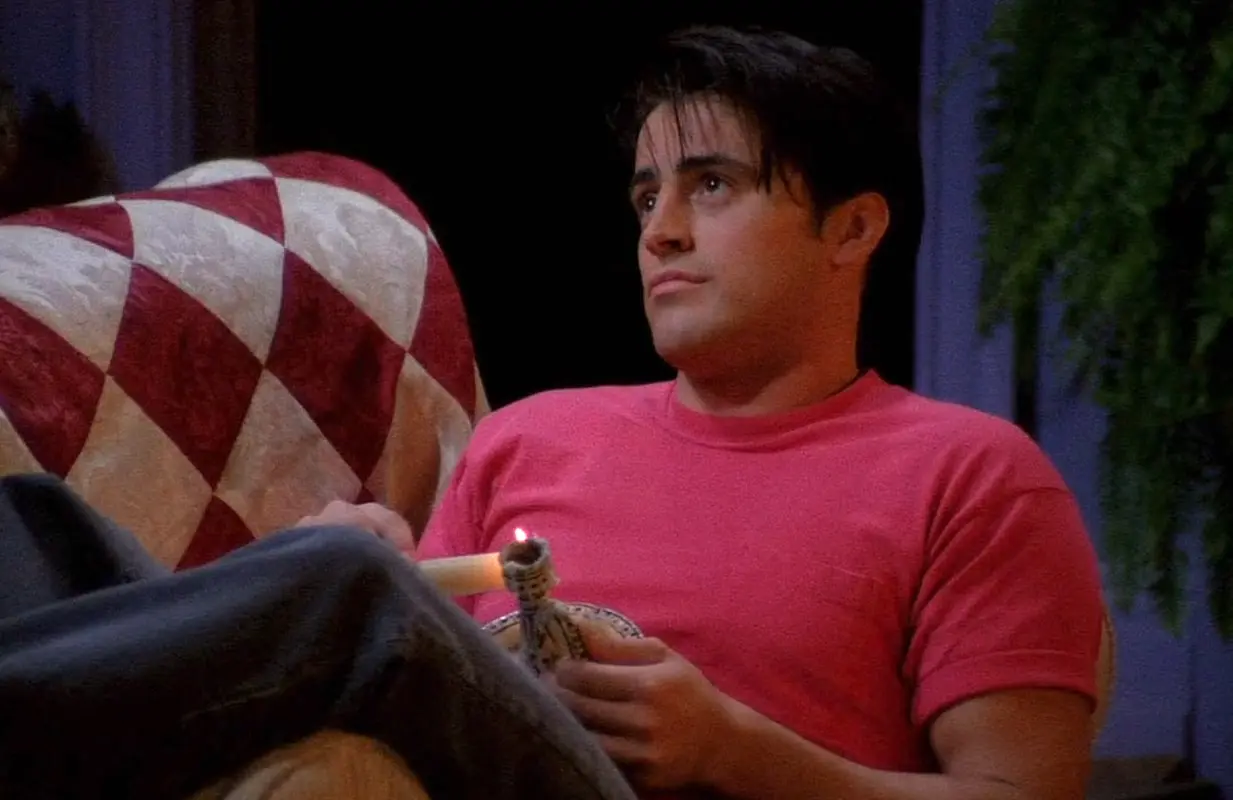We'll Never Really Know Which Friends Writer Came Up With 'Friend Zone'
-
 Matt LeBlanc (Screenshot: Friends)
Matt LeBlanc (Screenshot: Friends)On a break. Lobster. Smelly Cat. Commando. Regina Phalange. The beloved TV series Friends, which ended its 10-year-run 20 years ago on May 6, not only changed television but it also helped change the pop culture lexicon.
This could be because it coined a term we still reference today (David Schwimmer’s Ross felt it wasn’t a big deal that he’d slept with someone else because he and Jennifer Aniston’s Rachel had taken a break in their relationship) or simply popularized one (according to Saul Austerlitz’s book, Generation Friends, the term “going commando” was out there before the Season 3 episode “The One Where No One's Ready,” just not everyone knew it meant leaving the house without wearing underwear).
But is there any real way of knowing ahead of time if a line of dialogue or word choice will pop in the zeitgeist? Or maybe even become a catchphrase?
Jeff Astrof, a veteran TV writer whose credits in addition to Friends include underrated comedic gems like Trial & Error and Shining Vale, says no. He tells a story that he had Rachel say when she got her first paycheck as a waitress “who’s FICA and why is he getting all of my money?” on a whim. A few weeks later, he walked into a TGI Friday’s and saw a waitress wearing the phrase as a button on her uniform.
Yes. Someone was wearing it as a piece of flair.
But Friends is also seemingly responsible for some terms not directly associated with the show. In the first season episode “The One with the Blackout,” Joey (Matt LeBlanc) tells Ross he has no chance with Rachel because she’s put him in the “friend zone” and thus no longer sees him as a potential romantic partner. When Ross tries to argue otherwise, Joey doubles down and states that he’s, in fact, “mayor of the zone.” (Thirty-year spoiler alert: Joey was wrong).
That episode aired in 1994. As Vulture points out, the term “friend zone” didn’t become part of modern parlance until around 2012. In fact, so much time has passed since “Blackout” was conceived and produced that neither Astrof nor Mike Sikowitz, who share a writing credit for the episode, knows where it came from. Sikowitz even declined to be interviewed for this article, saying in an email that “it was so long ago and my memories of it are fuzzy at best. But whatever Jeff says, I’m sure I would stand by.”
Astrof also asked comedy writer Adam Chase, who worked on several seasons of the show and whom Astrof jokes is the writers' room’s unofficial historian, and he doesn’t know either.
The show’s writing room, like a lot of comedy writers’ rooms, was considered (for better or worse) a collaborative space. Just because your byline was on the episode didn’t mean all the dialogue was yours. A lot of the dialogue and situations were the kinds of things that only a group of comedy writers would come up with at three in the morning while fueled by snacks and energy drinks.
“Every writer remembers what joke is theirs,” Astrof says, noting that the concept of Rachel being Ross’ “lobster” came from fellow writer Alexa Junge. But, he says, “because [friend zone] wasn't a joke, it was a concept, I don't know that people would remember it.” He adds that “believe me, if I could take credit for it now knowing the social impact that it would have, I would take it, but I alas I can't.”
This social impact has, in fact, kind of come full circle and found its way into Astrof’s family. He’d just recently learned that this daughter was “friend-zoned” by someone. He says it's one of the few things in her life that he cannot take credit for ruining.
Whitney Friedlander is an entertainment journalist with, what some may argue, an unhealthy love affair with her TV. A former staff writer at both Los Angeles Times and Variety, her writing has also appeared in Cosmopolitan, Vulture, The Washington Post and others. She lives in Los Angeles with her husband, son, daughter, and two spoiled cats.
TOPICS: Friends, NBC, Alexa Junge, David Schwimmer, Jeff Astrof, Matt LeBlanc, Mike Sikowitz
- Who is Jasveen Sangha? Parents and more about Hollywood’s Ketamine Queen as she pleads guilty in connection to Matthew Perry’s death
- Ross and Rachel’s ending on Friends exposed how nostalgia tricks us into mistaking familiarity for destiny
- “I wonder how much this moron will pay”: Plasencia mocked Matthew Perry in texts while allegedly supplying him $4,500 worth of ketamine before his death
- Dark fan theory about Phoebe from Friends sparks explosive debate online